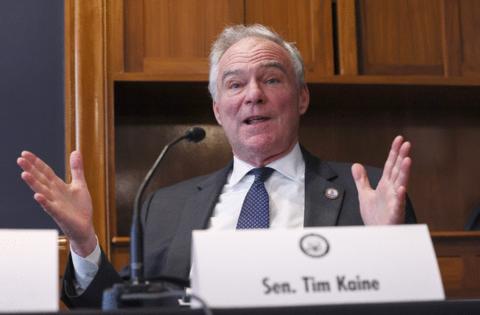This week: Congress debates war and reconciliation
Published in Political News
WASHINGTON – The budget reconciliation package continues to dominate the agenda in Congress this week, as lawmakers are also expected to debate President Donald Trump’s weekend military strikes against Iranian nuclear targets.
An all-senators briefing on the situation with Iran is slated for Tuesday afternoon, and a war powers resolution from Sen. Tim Kaine, D-Va., could see quick floor action. Kaine wants senators on the record on whether the United States should engage in hostilities against Iran.
While a Senate aide said the measure does not formally ripen for expedited consideration until the end of the week, Republicans may seek to clear it from the decks earlier in the week in order to get their sweeping budget reconciliation package on the floor.
“We will have all members of the Senate have to declare whether or not the U.S. should be at war with Iran,” Kaine said on Fox News Sunday. “It’s unconstitutional for a president to initiate a war like this without Congress. Every member of Congress needs to vote on this.”
Senate Minority Leader Charles E. Schumer, D-N.Y., who is among those pushing for expedited consideration, said in a statement issued after Trump announced the bombing campaign, “I am voting for it and implore all Senators on both sides of the aisle to vote for it.”
Senate Foreign Relations Chairman Jim Risch, R-Idaho, who backed Trump’s ordering of the bombing campaign, said the war “is Israel’s war not our war.”
“This is not the start of a forever war. There will not be American boots on the ground in Iran. This was a precise, limited strike, which was necessary and by all accounts was very successful,” Risch said in a statement. “As President Trump has stated, now is the time for peace.”
Senate committee staffers and the parliamentarian’s office were working through the weekend on the process known as the Byrd bath, seeking to determine which provisions of the GOP reconciliation bill are subject to parliamentary points of order that would require 60 votes to overcome.
The bill, which Republicans are calling the “big, beautiful” bill, is intended to advance Trump’s sweeping domestic policy policy priorities without being subject to a 60-vote threshold, but Senate budget rules could leave some key provisions on the cutting room floor. Republicans are likely to try to rewrite them to comply with the advisory opinions from Senate Parliamentarian Elizabeth MacDonough.
“Democrats plan to challenge every part of this bill that hurts working families and violates this process,” Sen. Jeff Merkley, D-Ore., the ranking member on the Budget Committee, said in a weekend statement.
Senate Republicans intend to get the reconciliation bill to the floor before departing for the Independence Day recess, meaning there’s a tight deadline for resolving parliamentary challenges and proceeding to a vote-a-rama, in which senators may offer unlimited amendments to the bill. July 4 itself does not arrive until a week from Friday, meaning the front end of the recess could be in jeopardy.
Appropriations in House
The House, meanwhile, returns from a Juneteenth recess poised to begin floor debate on fiscal 2026 appropriations, while waiting for the Senate to amend and send back the budget reconciliation package.
The Military Construction-VA spending bill, one of the first two measures advanced by the House Appropriations Committee this year, is likely set for floor consideration by the middle of the week, giving an opportunity for House Republicans to leave for the Independence Day recess on a high note. As it is the first fiscal 2026 spending bill to reach the floor, there could be interest among members in a lengthy amendment process.
“Congress has a duty to responsibly fund the government and provide for important programs that aid and protect the American people — such as supporting our servicemembers, veterans, and national defense — while cutting waste and ensuring taxpayer dollars are spent wisely,” the office of House Majority Leader Steve Scalise, R-La., wrote in an outline of the week’s schedule.
The House Appropriations Committee will be busy as well, with two new spending bills expected to reach the full-committee markup stage this week: the Homeland Security bill on Tuesday and the Legislative Branch bill on Thursday.
Senate appropriators, meanwhile, are continuing to hold hearings ahead of the July Fourth recess. That includes a Military Construction-VA Subcommittee hearing on Tuesday with Veterans Affairs Secretary Doug Collins.
Attorney General Pamela Bondi testifies at a subcommittee hearing Wednesday morning, but the potential for real fireworks in the spending debate comes Wednesday afternoon.
That’s when Russ Vought, director of the Office of Management and Budget, is scheduled to appear before the Senate Appropriations Committee to discuss Trump’s June 3 proposal for $9.4 billion in rescissions, including an $8.3 billion clawback of foreign aid and a $1.1 billion clawback of public broadcasting funds.
Under the process laid out in the 1974 law establishing the budget process, lawmakers have until midnight on July 18 to clear the package, or the administration’s request will expire and the funds, which are currently held, will need to be released. The expedited procedures governing impoundment tee up the Senate for another potential vote-a-rama in the work period after senators return from the Independence Day recess.
----------
—Aidan Quigley contributed to this report.
©2025 CQ-Roll Call, Inc., All Rights Reserved. Visit cqrollcall.com. Distributed by Tribune Content Agency, LLC.

























































Comments